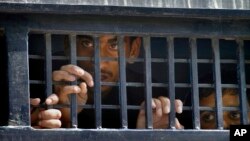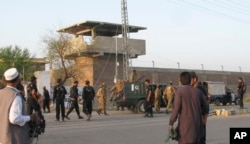Convicted militants and criminals imprisoned in Pakistan's Sindh province are reportedly running day-to-day affairs of the same prisons they are held captive in, according to a recent report by the province's Counter Terrorism Department (CTD).
The CTD initiated its investigation into prisons following the escape of two high-profile militants of Lashkar-i-Jhangvi, a banned Sunni militant group in Pakistan with ties to al-Qaida and the Taliban in Afghanistan. The two militants escaped from Karachi's heavily guarded prison in early June.
"Our investigation into the recent jailbreak revealed ... that prisons in Sindh, and particularly Karachi, are divided into zones among [a] few hard-core militants and terrorists who run the daily affairs," CTD chief Sanaullah Abbasi told VOA.
The CTD found that convicted militants roam around freely, rule over wards inside prison, force other inmates to obey their orders, have access to drugs and mobile phones, and manage their terror activities with impunity from inside the prison.
The CTD findings raised concerns that militants might be planning and coordinating terror attacks from inside prisons in Pakistan's third-largest province.
Reforms called vital
"Militants' running of jail affairs is alarming, but Sindh's jails had been plagued with the culture of convicted criminals ruling over them in the past as well," Jameel Yusuf, an activist and founder of the Citizens Police Liaison Committee, told VOA. The committee is a self-funded nongovernmental organization that gathers data on crime and extremist activities in Karachi.
"The government has no option but to come up with new prison reforms and to implement them," Yusuf added.
Officials cited corruption, incompetence and fear of militants' outside sympathizers as reasons behind militants' growing influence inside prisons in the province.
Sindh's capital, Karachi, the country's financial hub, is also home to several banned militant organizations, armed political parties and organized criminal gangs. The city's central jail holds more than 6,000 convicted terrorists and criminals.
"Lack of capacity of the jail administration, corruption, maladministration, fear and intimidation by the terrorist organizations have ruined our prison system," the CTD's Abbasi told VOA.
In 2014, security forces discovered an underground tunnel near Karachi's central jail that was to be used to break into the jail and facilitate the escape of several high-profile terrorists.
Prison search
Following last month's escape of the two militants from Karachi prison, security forces searched the prison and seized more than 300 mobile phones used by prisoners, along with drugs worth more than $20,000.
The incident led to the dismissal and arrest of several jail officials on charges of negligence, and security has since been heightened in all prisons across the province, according to officials.
"We've suggested to the government to take concrete steps to impose new jail reforms throughout Sindh and especially in Karachi," Abbasi said. "We've also suggested to move Karachi's main prison out of the city to a low-populated area."
Yusuf, of the Citizens Police Liaison Committee, agreed that provincial and central governments need prison reforms.
"It is absolutely necessary to provide training to the jail administration, to work on eliminating corruption within the staffers, and to provide jail authorities with modern, high-tech security equipment," he said.
The Sindh government said it planned to increase its security budget to combat crime and extremism within the province. It has allocated nearly $19 million to equip law enforcement agencies in the province with security equipment.
Murad Ali Shah, Sindh's chief minister, said strengthening law enforcement agencies is one of his government's top priorities.
"In these trying times, strengthening our law enforcement agencies through training and equipment is at the forefront of our fight against terrorism," Shah said during a recent speech regarding the state budget.







